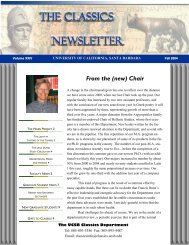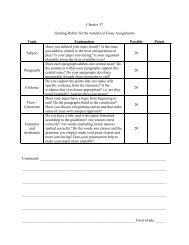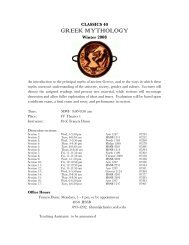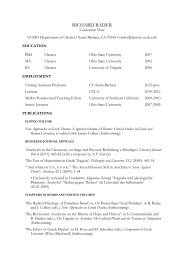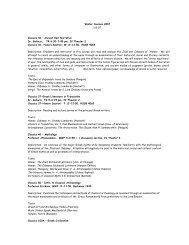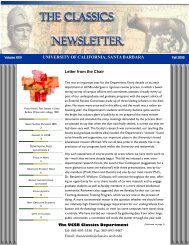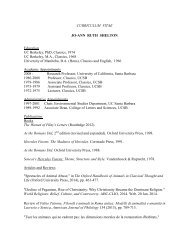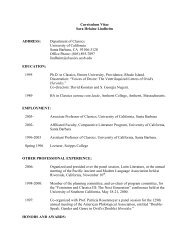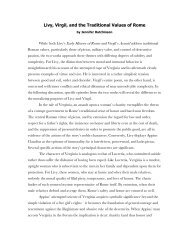Department of Classics
Department of Classics
Department of Classics
You also want an ePaper? Increase the reach of your titles
YUMPU automatically turns print PDFs into web optimized ePapers that Google loves.
<strong>Department</strong> <strong>of</strong> <strong>Classics</strong><br />
Course Descriptions - Fall 2008<br />
9-16-08<br />
<strong>Classics</strong> 36 – Ancient Epic Narrative<br />
Dr. Gallucci, TR, 5-6:15pm, Psych. 1924<br />
36H: T, 1-1:50, HSSB 4065<br />
Description: Description: Students and instructor in this course will read and analyze the Iliad<br />
and Odyssey <strong>of</strong> Homer. We will attempt to reach an understanding <strong>of</strong> the epics through an<br />
examination <strong>of</strong> their historical, social and literary contexts, the interplay between structure and<br />
meaning and the effects <strong>of</strong> literary allusion. We will explore the “divine machinery” <strong>of</strong> epic, the<br />
relationship <strong>of</strong> men and gods, and motivations <strong>of</strong> the heroic figures and will discuss ancient modes<br />
<strong>of</strong> narration in general, simile, and other forms <strong>of</strong> ornament or illumination, and ancient modes <strong>of</strong><br />
argument (praise, blame, pro<strong>of</strong>, rebuttal; consolation; exhortation, etc.)<br />
Mid-term; final; optional paper; no knowledge <strong>of</strong> Greek or Latin required.<br />
Texts:<br />
The Epic <strong>of</strong> Gilgamesh, trans. by Sandars (Penguin)<br />
Homer’s Iliad, Stanley Lombardo (Hackett)<br />
Homer, Odyssey, tr. Stanley Lombardo (Hackett)<br />
The Aeneid, Vergil, trans. by S. Lind (Indiana University Press)<br />
Trojan War, Strauss (Simon and Schuster)<br />
<strong>Classics</strong> 39 – Women in Classical Literature<br />
Dr. Gallucci, TR 3:30-4:45, Psych. 1902<br />
Description: Study <strong>of</strong> the portrayal <strong>of</strong> women in selected Greek and Latin authors from the<br />
seventh century B.C. to the second century A.D. and this portrayal’s relationship to the<br />
literary, historical, and social backgrounds <strong>of</strong> the works concerned.<br />
Texts:<br />
Oresteia, Aeschylus (Oxford)<br />
Sophocles, Antigone, Oedipus the King, Electra (Oxford)<br />
Homer, Odyssey, tr. Stanley Lombardo (Hackett)<br />
Vergil, Aeneid, tr. Lind (Hackett)<br />
Women in Classical World, ed. Fantham (Oxford)<br />
<strong>Classics</strong> 40-Mythology<br />
Pr<strong>of</strong>essor Erickson, MWF 9-9:50, IV Theater 1<br />
<strong>Classics</strong> 40H: M 1-1:50, HSSB 4202<br />
Description: Introduction to the principal myths <strong>of</strong> ancient Greece and the ways in which<br />
these myths have been understood.
Fall Course Descriptions - 2<br />
Texts:<br />
Classical Myth, Barry Powell (Prentice Hall/Pearson)<br />
Homeric Hymns, Apostolos Athanassakis (Johns Hopkins)<br />
Hesiod, Theogony, Works and Days, Shield,, Apostolos Athanasakis (Johns Hopkins)<br />
Homer, Odyssey (Penguin)<br />
Euripides, Euripides V, Three Tragedies (Univ. <strong>of</strong> Chicago)<br />
Aeschylus, Aeschylus I, Oresteia (Univ. <strong>of</strong> Chicago)<br />
Homer, Iliad, Fagles (Penguin)<br />
Honors Section:<br />
Did the Greeks Believe in Their Myths? Paul Veyne (Univ. <strong>of</strong> Chicago)<br />
The Epic <strong>of</strong> Gilgamesh, Maureen Kovacs(Stanford Univ.)<br />
Myth and Society in Ancient Greece, Jean-Pierre Vernant (Zone Books)<br />
Pausanias, Guide to Greece, Volume I: Central Greece (Penguin)<br />
Callimachus, Hymns, Epigrams, Selected Fragments (Johns Hopkins)<br />
<strong>Classics</strong> 50 – Intro to Classical Archaeology<br />
Dr. Mazza, MWF 11-11:50, HSSB 1174<br />
Description: Examines the techniques and methods <strong>of</strong> classical archaeology as revealed<br />
through an examination <strong>of</strong> the major monuments and artifacts <strong>of</strong> the Greco-Roman world<br />
from prehistory to the Late Empire.<br />
Texts:<br />
Classical Archaeology, Alcock/Osborne (Wiley-Blackwell)<br />
Ancient Cities, Charles Gate (Routledge)<br />
<strong>Classics</strong> 130- Comedy and Satire<br />
Pr<strong>of</strong>essor Dutsch, MWF 9-9:50, HSSB 1174<br />
Description: The comic playwrights, such as Aristophanes and Plautus, and satirists, such as<br />
Lucian and Juvenal, in English translation.<br />
Texts:<br />
Aristophanes, Complete Plays (Penguin)<br />
Plautus, Five Comedies (Hackett)<br />
<strong>Classics</strong> 180A – Advanced Study in Classical Civilization<br />
Dr. Gallucci, TR 9:30-10:45, HSSB 4065<br />
Description: Perhaps the most famous story in Greek mythology is the tale <strong>of</strong> Troy.<br />
Generations <strong>of</strong> students (and movie-makers) have read the story <strong>of</strong> how Troy was destroyed<br />
by Greek forces led by King Agamemnon <strong>of</strong> Mycenae and <strong>of</strong> the exploits <strong>of</strong> the various<br />
heroes in Homer’s Iliad. In this class we will examine the archaeological record <strong>of</strong> Troy<br />
which was first excavated in the 1870’s by Heinrich Schliemann. We will also read the Iliad,<br />
2
Fall Course Descriptions - 3<br />
Odyssey, and various research articles, looking at the relationship <strong>of</strong> Troy and the Trojan<br />
War to history. Some <strong>of</strong> the questions that scholars have discussed include: Was there<br />
really a Trojan War or was it just made up? If Homer is composing four to five hundred<br />
years after the fact (in ca. 800-700 BC), how accurate can his story be? Can oral traditions<br />
go back this far in time? What is the relationship <strong>of</strong> the world Homer describes in the Iliad<br />
to that <strong>of</strong> the time period he is describing, late 13 th century Bronze Age Greece. For<br />
example, are the military practices and weapons Homer mentions accurate reflections <strong>of</strong><br />
those <strong>of</strong> the late Bronze Age? Were the gods <strong>of</strong> Homer’s Iliad in existence in the late<br />
Bronze Age? Was the late Bronze Age an age <strong>of</strong> kings as described by Homer? To answer<br />
such questions, we look at the history and nature <strong>of</strong> selected Bronze Age kingdoms <strong>of</strong> the<br />
eastern Mediterranean, investigate comparative oral traditions (especially recent<br />
Anthropological studies) and epic poetry (e.g., European and Near Eastern epic), determine<br />
how accurately historical information can be passed down orally over several centuries, and<br />
compare the archaeological and historical relationship <strong>of</strong> late Bronze Age Greece and Dark<br />
Age Greece (1100-750 BC) with the world described by Homer.<br />
Texts:<br />
Homer, Iliad (Richmond Lattimore translation) (Univ. <strong>of</strong> Chicago)<br />
Homer, Odyssey (Richmond Lattimore translation) (Harper-Collins)<br />
Epic <strong>of</strong> Gilgamesh, Sandars (Penguin)<br />
The Trojan War, A New History, Strauss (Simon and Schuster)<br />
In Search <strong>of</strong> the Trojan War, Michael Wood (Univ. <strong>of</strong> .Calif. Press)<br />
The Trojan War, Carol Thomas and Craig Conant's (Univ. <strong>of</strong> Oklahoma)<br />
<strong>Classics</strong> 211 – History <strong>of</strong> Greek and Latin Literature<br />
Various Pr<strong>of</strong>essors. Coordinator: Pr<strong>of</strong>essor Dunn. M 4-5:50; HSSB 4065<br />
tba<br />
<strong>Classics</strong> 235 – Textual Criticism<br />
Pr<strong>of</strong>essor Renehan, W 3:30-6:20pm, HSSB 4065<br />
Description: A graduate- level, "hands on" introduction to the principles and practice <strong>of</strong><br />
textual criticism. The chief continuous text to be examined will be the corpus Theognideum<br />
(including some exposure to the most important manuscript) but specimen examples from a<br />
variety <strong>of</strong> authors will also be studied.<br />
Text:<br />
Delectus ex Iambis et Elegis Graecis, M. L. West (Oxford)<br />
Greek 1- Elementary Greek<br />
Mr. Souther, MTWRF, 2-2:50, HSSB 1211<br />
Description: Greek 1 is the first <strong>of</strong> a 3-quarter sequence in beginning Ancient Greek. No<br />
knowledge <strong>of</strong> Greek is assumed. Fundamentals <strong>of</strong> grammar and syntax will be taught in<br />
conjunction with reading <strong>of</strong> elementary texts.<br />
Text:<br />
3
Fall Course Descriptions - 4<br />
New Intro to Greek, Third Edition, Chase and Phillips (Harvard)<br />
Greek 11 – Modern Greek<br />
Dr. Skapoulli, MTWRF 2-2:50, HSSB 1215<br />
Description: Greek 11 is the first <strong>of</strong> a 3-quarter sequence in beginning MODERN Greek. No<br />
knowledge <strong>of</strong> Greek is assumed.<br />
Text/tapes:<br />
Greek Today: A Course in the Modern Language and Culture<br />
Greek Today Workbook, Editors: Bien; Gondicas; Rassias; Karanika; Yiannakou-Bien.<br />
Greek 100 – Greek Prose<br />
Pr<strong>of</strong>essor Dunn, MWF 12-12:50, HSSB 4201<br />
Description: Reading and analysis <strong>of</strong> Attic prose writers such as Xenophon, Plato to develop<br />
reading skills and introduce study <strong>of</strong> the style and thought <strong>of</strong> historical, rhetorical and/or<br />
philosophical writers.<br />
Texts:<br />
Smyth, Greek Grammar (Triliteral/Harvard)<br />
Freeman, Greek Readers for Schools (Bolchazy)<br />
Greek 173/273-Hellenistic Poets<br />
Pr<strong>of</strong>essor Dunn, MW 2-3:20, HSSB 4065<br />
Description: Introduction to poetry <strong>of</strong> the Alexandrian period, normally concentrating upon a<br />
single major poet such as Apollonius Rhodius, Callimachus, or Theocritus. Reading, translation and<br />
discussion, with attention to language, meter, generic innovation, cultural context, and formative<br />
influence upon Latin literature.<br />
Text:<br />
Theocritus: Selected Poems, Dover (Bolchazy)<br />
Latin 1 - Elementary Latin, 001, Pr<strong>of</strong>essor Lindheim, MTWRF, 10:00-10:50, HSSB 1231<br />
Latin 1 - Elementary Latin, 002, Staff, MTWRF, 11:00-11:50, HSSB 1223<br />
Latin 1 – Elementary Latin, 003, Staff, MTWRF, 12:00-12:50, HSSB 1210<br />
Description: Course will cover the fundamentals <strong>of</strong> Latin forms and grammar.<br />
For all sections: Texts:<br />
Wheelock’s Latin (Harper)<br />
Wheelock’s Latin Workbook (Harper)<br />
Thirty-Eight Latin Stories, Groton and May (Bolchazy)<br />
English Grammar for Students <strong>of</strong> Latin, Goldman and Szymanski (Olivia Hill)<br />
4
Fall Course Descriptions - 5<br />
Latin 100-Introduction to Prose<br />
Staff, MWF 1-1:50, SH 1431<br />
Description: Translation and analysis <strong>of</strong> Latin prose authors, including Caesar and Cicero,<br />
combined with review <strong>of</strong> Latin grammar and syntax.<br />
Texts:<br />
Latin 103: Medieval Latin<br />
Pr<strong>of</strong>essor English, MW 3:30-4:45, Girvetz 1112<br />
Description: The course will present the basic points <strong>of</strong> Medieval Latin grammar, syntax,<br />
and vocabulary. Students should have already have a basic knowledge <strong>of</strong> classical Latin. We<br />
will translate a variety <strong>of</strong> prose texts, some poetry, and a few exemplary texts from<br />
Theology/Philosophy or notarial documents, all from between 300 CE and 1600 CE. Students<br />
will be able to suggest texts fro translation. Although we will discuss and compare<br />
particular points <strong>of</strong> Medieval grammar and usage with classical forms, the emphasis <strong>of</strong> the<br />
course will be on translating. Students will be graded on quizzes and their translations in<br />
class. There will be a take-home final examination.<br />
Texts:<br />
Reading Medieval Latin, Keith Sidwell (Cambridge University Press)<br />
Wheelock's Latin, 6th edition (Harper), as a reference tool<br />
A Primer <strong>of</strong> Ecclesiastical Latin, John F. Collins (Catholic University <strong>of</strong> American Press)<br />
Latin 120/220 – Sallust<br />
Pr<strong>of</strong>essor Morstein-Marx, TR 11-12:20, HSSB 4065<br />
Description: Sallust: Bellum Catilinae: Sallust on the "Fall <strong>of</strong> the Roman Republic."<br />
Historical as well as historiographical issues will be emphasized. One brief presentation (for<br />
graduate students); midterm and final exams; paper optional.<br />
Text:<br />
C. Sallusti Crispi, Catilinia, Iugurtha Historiarum Fragmenta Selecta etc., ed by L. D.<br />
Reynolds (Oxford, c 1991)<br />
Latin 135/235 – Vergil<br />
Pr<strong>of</strong>essor Lindheim, TR 2-3:20, HSSB 4065<br />
5
Fall Course Descriptions - 6<br />
Description: Reading, translation, and discussion <strong>of</strong> style and meter <strong>of</strong> Vergil's epic poem<br />
Aeneid, as well as his Georgics and Eclogues.<br />
Texts:<br />
Vergil, Opera (Oxford) (978 019 8146537)<br />
Virgil, Aeneid I-VI (IPM) (978 1853994968)<br />
Virgil, Aeneid, VII-XII (IPM) (978 1 85399 5002)<br />
6



